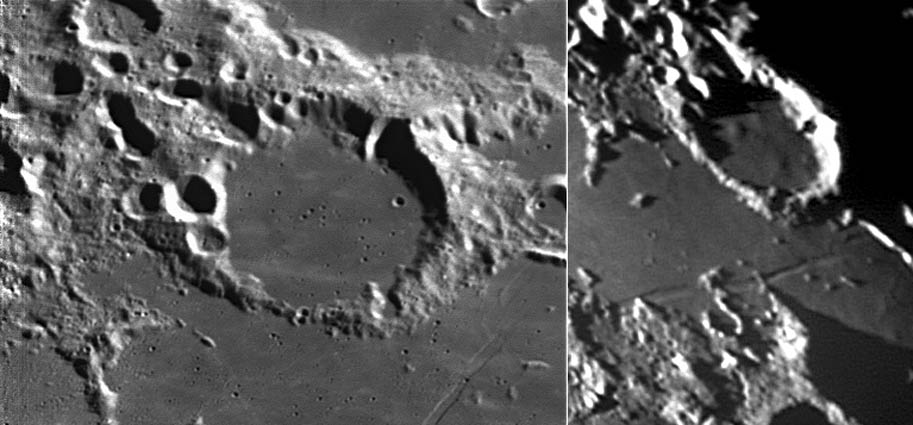Difference between revisions of "February 11, 2005"
| Line 12: | Line 12: | ||
</table> | </table> | ||
<table width="80%" border="0" align="center" cellpadding="8"> | <table width="80%" border="0" align="center" cellpadding="8"> | ||
| − | <tr><td><div align="center" class="main_sm">Image Credit: [mailto:starman2@charter.net Wes Higgins (left) ] and [mailto:kcpaulhk@yahoo.com.hk K.C. Pau (right) ]</p> | + | <tr><td><div align="center" class="main_sm"><p>Image Credit: [mailto:starman2@charter.net Wes Higgins (left) ] and [mailto:kcpaulhk@yahoo.com.hk K.C. Pau (right) ]</p> |
</div></td> | </div></td> | ||
</tr> | </tr> | ||
| Line 21: | Line 21: | ||
<p align="left">Here are two images of the 60 km wide crater Capuanus in Palus Epidemiarum. Although they differ in scale, resolution and lighting, both are valuable in increasing understanding of this piece of the lunar surface. KC’s low Sun view reveals the three or four known but difficult to image domes that formed when mare lava erupted onto the floor of Capuanus. Wes’ high resolution image provides a new level of documentation of the subsequent modification of the floor by impact cratering and delicate ray draping. Comparing the two images shows that the domes are almost completely undetectable at high Sun, but that for the two largest domes very, very subtle rises are hinted at, possibly with summit craters. A rectification, rescaling and co-alignment of the two images is absolutely necessary, however, to test this speculative matching. And comparisons with other images too! </p> | <p align="left">Here are two images of the 60 km wide crater Capuanus in Palus Epidemiarum. Although they differ in scale, resolution and lighting, both are valuable in increasing understanding of this piece of the lunar surface. KC’s low Sun view reveals the three or four known but difficult to image domes that formed when mare lava erupted onto the floor of Capuanus. Wes’ high resolution image provides a new level of documentation of the subsequent modification of the floor by impact cratering and delicate ray draping. Comparing the two images shows that the domes are almost completely undetectable at high Sun, but that for the two largest domes very, very subtle rises are hinted at, possibly with summit craters. A rectification, rescaling and co-alignment of the two images is absolutely necessary, however, to test this speculative matching. And comparisons with other images too! </p> | ||
<blockquote> | <blockquote> | ||
| − | <p align="right">— [mailto:tychocrater@yahoo.com Chuck Wood]</blockquote> | + | <p align="right">— [mailto:tychocrater@yahoo.com Chuck Wood]</p></blockquote> |
<p align="left"><b>Technical Details:</b><br> | <p align="left"><b>Technical Details:</b><br> | ||
Left (Higgins): Nov 5, 2004. 18" Starmaster DMK-21F04 Firewire Camera.<p> | Left (Higgins): Nov 5, 2004. 18" Starmaster DMK-21F04 Firewire Camera.<p> | ||
| Line 28: | Line 28: | ||
<p><b>Related Links:</b><br> | <p><b>Related Links:</b><br> | ||
Rukl Plate 63 | Rukl Plate 63 | ||
| + | </p> | ||
<p align="left"><b>Tomorrow's LPOD: </b> Baby Moon</p> | <p align="left"><b>Tomorrow's LPOD: </b> Baby Moon</p> | ||
</tr> | </tr> | ||
Revision as of 21:16, 17 January 2015
Seeing Double at Capuanus
Image Credit: Wes Higgins (left) and K.C. Pau (right) |
|
Seeing Double at Capuanus Here are two images of the 60 km wide crater Capuanus in Palus Epidemiarum. Although they differ in scale, resolution and lighting, both are valuable in increasing understanding of this piece of the lunar surface. KC’s low Sun view reveals the three or four known but difficult to image domes that formed when mare lava erupted onto the floor of Capuanus. Wes’ high resolution image provides a new level of documentation of the subsequent modification of the floor by impact cratering and delicate ray draping. Comparing the two images shows that the domes are almost completely undetectable at high Sun, but that for the two largest domes very, very subtle rises are hinted at, possibly with summit craters. A rectification, rescaling and co-alignment of the two images is absolutely necessary, however, to test this speculative matching. And comparisons with other images too! Technical Details: Right (Pau): Oct 23, 2004, 12h15m (UT). 10" f/6 Newtonian + 20mm eyepiece + Philips Toucam Pro Related Links: Tomorrow's LPOD: Baby Moon |
|
Author & Editor: Technical Consultant: Contact Translator: A service of: |
COMMENTS?
Register, and click on the Discussion tab at the top of the page.




